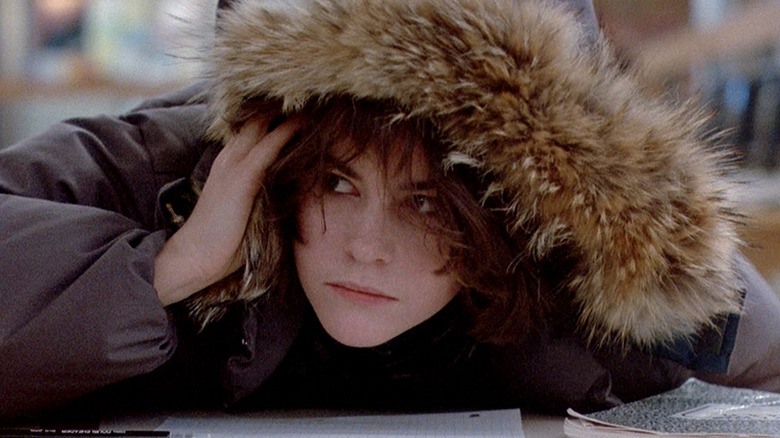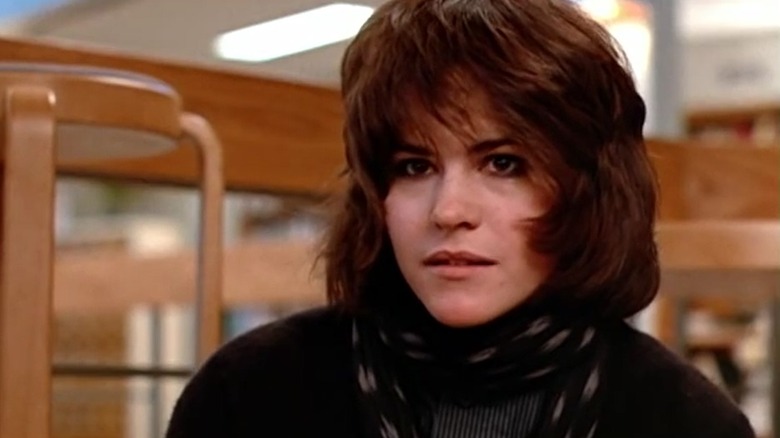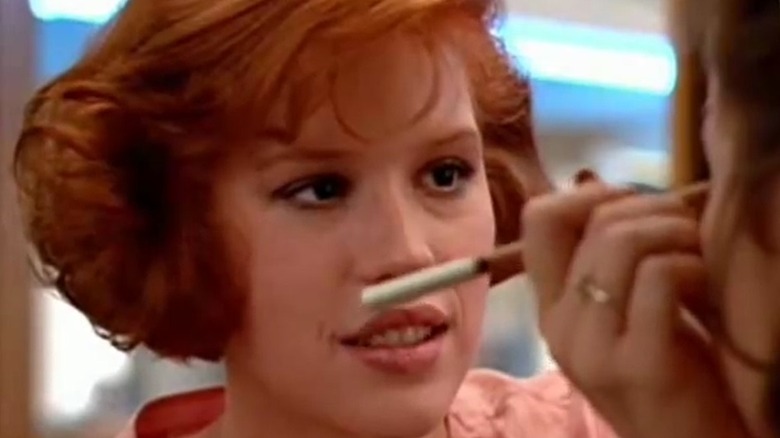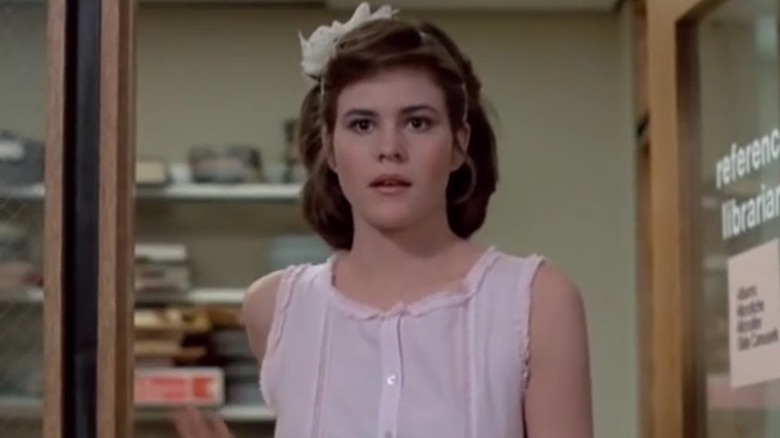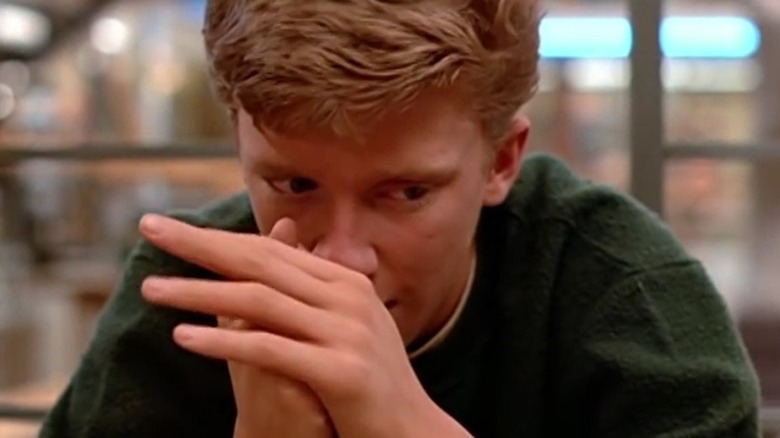Things About The Breakfast Club You Only Notice As An Adult
The brain, the athlete, the basket case, the princess, and the criminal — these are the beloved archetypes of The Breakfast Club, an iconic John Hughes film that defined the American adolescent experience in the 1980s. It dealt thoughtfully with themes like alienation, family dysfunction and abuse, peer pressure, and societal expectation, showing just how difficult the high school experience could be. And unlike other teen movies, even being the prom queen or star athlete couldn't save you from the perils of growing up in America.
But a lot has changed since 1985, so if you haven't watched the movie since then you're going to notice a whole lot that you might have missed at the time. Here are things you only notice about The Breakfast Club as an adult.
There are a ton of LGBT slurs and stereotypes
LGBT depictions are pretty much non-existent in The Breakfast Club, but there are plenty of gay slurs and stereotypes present in the film that wouldn't make it into a film made today. For one, a gay slur is prominently scrawled on John's locker, supposedly acting as a deterrent to anyone who would want to break into it. Then, John calls Vern a "brownie hound" toward the beginning of the film, and Andrew calls John a "f*****" not ten minutes later. John retorts by commenting on Andrew's wrestling practice, saying, "I have such a deep admiration for guys who roll around on the floor with other guys." Even Brian participates in the gay shaming, genuinely surprised to learn that Andrew wears "tights" as part of his wrestling uniform.
John sexually harasses Claire throughout the entire movie
It's obvious to anyone watching The Breakfast Club that John gives Claire a hard time, but he actually spends the entire movie sexually harassing her in some really despicable ways. He starts right off the bat, suggesting that they close the door and "get the prom queen impregnated." Then he asks Andrew if he slips Claire "the hot beef injection," prompting her to tell him to go to hell.
He torments her about her virginity, and in graphic detail asks her about her sexual experiences until Andrew finally steps in and tells him to leave her alone. Later, he asks her if she wants to see a picture of "a guy with elephantitis of the nuts" and asks her if she would date a man like that, noting that his testicles would have to ride shotgun. Then when she's eating sushi, he remarks, "You won't accept a guy's tongue into your mouth and you're gonna eat that?"
Most egregiously, he puts his face in Claire's crotch when he is hiding under the table, forcing her to physically resist him. And he rounds it out when he slut shames her after the lipstick trick. I had a huge crush on John Bender when I was younger, but as an adult his behavior is unacceptable.
John Bender's trauma is real
John Bender's home life sounds genuinely miserable to anyone watching the film. But as an adult it's especially terrifying, as the abuse he describes can cause severe emotional, mental, and physical trauma. This is most evident when he describes what life is like for him at home, taking on the roles of his two parents during a confrontation. That's some very disturbing verbal abuse to witness and endure. Additionally, he later shows Andrew a scar on his arm, made by his father's lit cigar, after he spilled paint in the garage. That's grounds for investigation, according to Child Protective Services.
Allison's line about rape is disturbing
When you're young, you might not understand the machinations at work that perpetuate rape culture. That's why you might miss just how disturbing Allison's anecdote about sleeping with her therapist really is.
She says, "I don't think that from a legal standpoint that what he did can be construed as rape since I paid him." That's a reflection of how rape culture twists reality and disempowers women. And it's doubly messed up since she's actually lying, just to make Claire divulge personal details about her sex life. Claire is clearly — and rightly — grossed out, as she replies, "He's an adult," and points out that he's also married.
Principal Vernon could be arrested for abuse
Principal Vernon is the villain of the movie, and is fleshed out as an entitled, condescending, and bitter person who resents his students and his station in life. But he's also a dangerous man who could be arrested and charged for the way he treats John Bender.
For one, he threatens to shake the screw out of John's pocket after the door malfunctions, a clear physical threat. Then, after yelling at John and giving him two months of detention, he tells the other students to go visit John in five years to "see how funny he is," insinuating that John will be a failure. Later, when they're alone in the closet, he asks John if he's going to cry. Then he tells him he'll always be watching him, and that he'll "beat the s***" out of him. Satisfied with himself, he asks John, "What are you gonna do about it?"
John then asks him if he's being threatened, and Vernon replies, "You think anyone's gonna believe you? You think anyone is gonna take your word over mine?" Finally, he tries to get John to physically fight him, calling him "a gutless turd" when John does not respond. There's no question that this is abusive behavior, punishable by law.
Virginity is a gendered stigma
The Breakfast Club did not shy away from addressing difficult topics like sex, drugs, and dysfunctional family life, and in a surprisingly woke way, it shows how the concept of virginity carries different stigmas depending on your gender. For one, John mocks Brian pretty ruthlessly for being a virgin, making him feel undesirable and unmanly, equating sexual conquest with masculine prowess. But Claire doesn't see it that way, instead giving a softer take, saying that she thinks it's totally okay for men to be virgins.
Virginity is just as fraught — if not more so — for women in the film. This point gets made after Claire's been coerced into divulging her status by the entire group, admitting that she's never "done it." And Allison notes that it's not easy to just tell the truth, noting, "If you say you haven't, you're a prude. If you say you have, you're a slut. It's a trap." That's pretty astute for a so-called '80s teen movie.
It passes the Bechdel Test
It's impressive that a film made in 1985 not deliberately about women managed to pass the Bechdel Test. That said, it barely scoots by, as the only identifiable time when Allison and Claire talk to each other about something other than men is at the end, during the makeover scene. They talk about make-up, something that ends up helping Allison be viewed as attractive by Andrew — not exactly a feminist revolution.
But then Allison asks Claire why she is being so nice to her, and Claire responds, "Because you're letting me." You can read something profound into that, namely that it's not easy being a woman in a climate where you're always pitted against each other.
Allison's makeover was kind of a letdown
Back in the 1980s, Allison's style was not considered to be particularly in vogue. She's meant to look crazy and unkempt, and not particularly attractive — although Ally Sheedy is gorgeous, so they shot themselves in the foot with that one. But as an adult so many years later, you can really appreciate her look. She was totally unique in her appearance, exuding a mysterious and artsy air. So when she emerges from the makeover Claire gives her at the end, which is supposed to make her look beautiful and attractive, she's lost her unique, weird charm in favor of looking more "normal" and mainstream. It's a letdown to see her conform.
No one acts like Andrew when they're high
The pot smoking scene in The Breakfast Club is a memorable one. Brian dons a pair of sunglasses and clowns around, Claire starts rhapsodizing about how popular she is, and John plays it cool, as usual. Andrew, on the other hand, must have been smoking something else in the foreign language room. He runs around dancing, leaps over bookshelves, yells and grunts, pumps his fists, and unleashes a barbaric yawp that shatters the glass in the door. Maybe an upper like cocaine or methamphetamine would cause that response, but certainly not marijuana.
Note Brian's description of his cousin Kendall, and his experience with marijuana: he craved weird foods, said that he felt like he didn't belong anywhere, and that it felt like The Twilight Zone. That's much more accurate.
It shows the toxic culture in male sport
If you haven't participated in school athletics in recent years, you might not know just how intense they can be. But as an adult who's endured the pressure of varsity competition, or perhaps as the parent of a young student athlete, you know just how exhausting some of those school sports can be, and not just physically.
The Breakfast Club is not far off when it comes to its depiction of high school wrestling or the toxic masculinity that is so often inherent in it. So when John mocks Andrew about "missing the big meet," he probably had no idea what kind of pressure cooker Andrew was living in — and how the environment turned Andrew into a bully. That was the impetus to torture Larry Lester and tape his buttocks together for the amusement of his father and teammates, who approve of the behavior even though it's abusive. The pressure to succeed and be as masculine as possible trumps empathy for other people.
It shows the real pressure to get good grades
The pressure to succeed academically is not some fabrication or a predicament unique to Brian's life. In fact, the reality is that it can be overwhelming and all-consuming, and in some cases can drive seemingly successful, thriving, and happy students to commit suicide. So when Brian brings a gun to school after getting a failing grade on a shop project, he joins the ranks of the many kids who have thought about suicide as a way out of an academically impossible situation.
It's not uncommon at all for a single bad grade to feel like the herald of imminent, academic failure, so the pressures faced be overachieving academics should be taken quite seriously.
